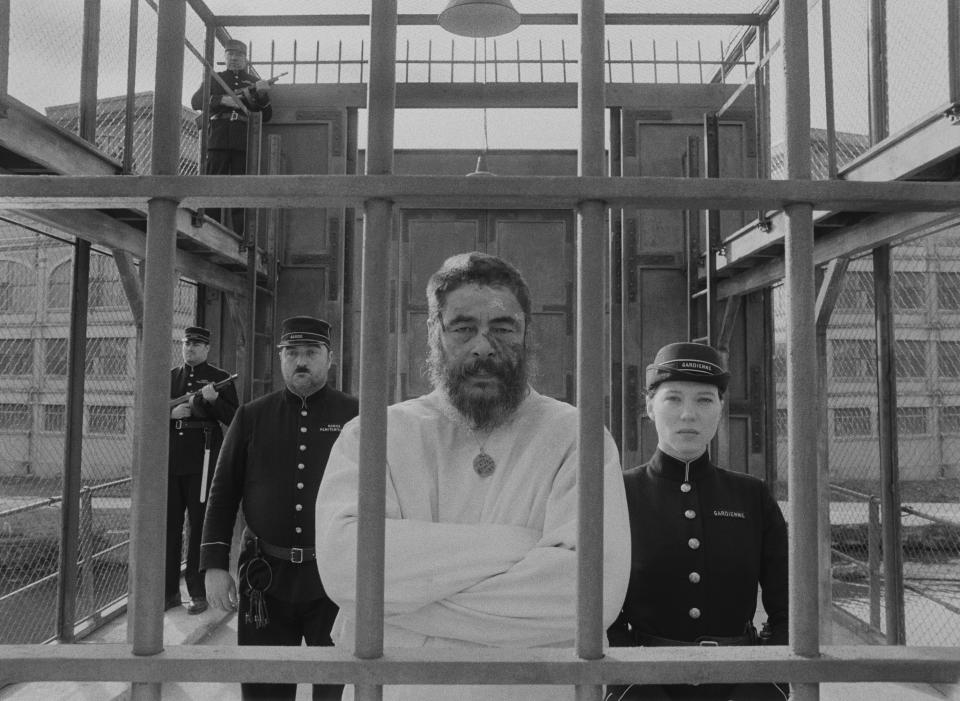Specialty Distribution Is Changed Forever. Here’s What Cannes Taught Us About the New Normal

The 2021 Cannes Film Festival was a celebration. Buyers and sellers were genuinely delighted to see each other in the sunshine on the Croisette after a two-year absence, and to watch great films with their vaccinated peers in the Palais. Everyone returned with a fresh perspective; many spent time in lockdown focusing on new strategies. There’s no shortage of titles in the pipeline, thanks to increased investment in early productions — the better to compete with streamers, of course.
“Being here in this moment feels like our emergence as a community, to come together in this place to celebrate what it means for cinema,” said Focus Features chairman Peter Kujawski, who brought “Stillwater” and “Blue Bayou” to Cannes. “You feel the resurgence, a new energy around it.”
More from IndieWire
Nic Cage's Worries About His Cat Fueled His 'Haiku' of a Performance in 'Pig' -- Q&A
The Best Movies of the 2021 Cannes Film Festival, According to 31 Critics
“There’s a lot to cheer about,” said Sony Pictures Classics co-president Michael Barker, who brought British costume romance “Mothering Sunday” to the festival and later acquired Juho Kuosmanen’s Arctic train saga “Compartment Number 6,” which shared the Cannes Grand Prix. “Everyone is in renewal mode.”
Cannes also gave me an opportunity that’s been in very short supply: Talk with all of the major specialty distributors about what they expect from the future. At Cannes 2019, some of the current issues were in play — a question of theatrical windows here, discussion of day-and-date strategies there — but there were no delusions that the business isn’t experiencing a wholesale overhaul. Today, it’s as much a fact as gravity.

Searchlight Pictures. © 2021 20th Century Studios
On the record, specialty executives are upbeat about the future of the film industry. Privately, it’s a different story. (Some declined to speak on the record at all.) Everyone shares the concern about an increasingly fragile theatrical ecosystem and an uncertain future. What happens to the solid films that are great cinema but not award events? So far, 2021 has not delivered a breakout specialty hit. Will Wes Anderson’s starry “The French Dispatch” (October 22, Searchlight), which met a mixed Cannes reception, fit the bill?
The platform model is in retreat, where movies build word of mouth in a few theaters in New York and Los Angeles and maybe a few major markets before slowly rolling out around the country. Most specialty distributors have abandoned this approach in favor of a shorter, wider release (150-300 screens) with a quick marketing hit ahead of VOD. “New films coming into the market are not going to last,” said one distributor. “We’re unsure what the levels will be. As exhibitors put in new films, the old ones are not going to stay.”
As a result, distributors are lowering box-office projections. “An $800 per-screen average is great!” said one distributor. “You celebrate. It is going to even out as we figure out the new normal. What that is, I have no idea. It’s not going to go back to what it was before.”
Many indies were already intimately familiar with digital platforms — unlike studios, which are still crunching numbers on streaming options, day-and-date releases, and VOD price points. “We didn’t pull back, we leaned into it,” said IFC Films president Arianna Bocco, whose company has been at the forefront of same-day distribution models for years. “Audiences never left. They were watching films differently.”
During lockdown, Bleecker Street released eight movies via theaters, platforms, and Hulu including British comedy “Military Wives,” John Shanley romance “Wild Mountain Thyme,” and gay love story “Supernova.” “The idea was to provide content for audiences wherever they were comfortable during the pandemic,” said CEO Andrew Karpen. “They could go to a theater, or not, with the film available shortly thereafter.”

Michael Buckner for PMC
More specialty distributors will be conservative and curatorial about what deserves a full-bore theatrical release. Select a few strong candidates for the top push, give another batch a medium-level opening in theaters, and let the rest go out day-and-date.
“It’s going to be a higher bar of what will drive people to leave the house, motivate people to go out on a Friday night, to want to interface with humanity,” said Kujawski. “What is compelling and appealing enough, to draw people out? The higher bar is the cultural one, of what’s special and unique enough.”
Even longtime holdouts like Sony Pictures Classics acknowledge that change is now. This summer, it released “12 Mighty Orphans” June 11 in Texas on 116 screens, followed by 1,000 the following week shortly before hitting VOD. This is not their usual pattern.
“‘I don’t know’ is a favorite phrase I use a lot,” said Barker. He still believes in the long-tail value of theaters, but adds, “The public is coming back slower than I was expecting, but it is happening… We do what it takes to generate the most revenues.”
How, where, and when adult moviegoers will start buying tickets is the great unknown. “Most of the audience is not still back in the theaters,” said Karpen, who is releasing eight films in 2021. “Will they come back to old theater business levels, or is what happened last year the new norm? I do believe they will come back, so we don’t want to take too much of what happened in the last six months and apply it to the release of future films.”

The crowded fall release slate could lure cinephiles. “I have a lot of faith they will come back,” said Bocco, who is throwing into the fall mix three Cannes Competition titles: Paul Verhoeven’s “Benedetta,” Jacques Audiard’s “Paris, District 13,” and Mia Hansen-Love’s “Bergman Island.” “It will take time. The well-reviewed films that were going to rise to the top, I do believe audiences will continue to find them and go to see them.”
“One reason the audiences are not coming is not just the pandemic,” said Barker, who is finally releasing Roger Michel’s held-back Helen Mirren comedy “The Duke” in September. “They’re not finding movies that turn them on. Fall brings a spectacular trove of movies. A lot of independents and studios will knock each other out. But it’s a good way of jump-starting the audience with an embarrassment of riches.”
As to how much time those films will spend in theaters, that’s anyone’s guess. “The specialty market has nuance to distribution,” said Karpen. “There is no one window. That’s the dilemma. There’s day-and-date streaming, a short window to streaming, and a PVOD window, and everybody is doing it differently. It continues to shake itself out as people learn, as mergers happen, and people’s goals and agendas change.”
IFC has released day and date for 15 years, collecting stats and data other companies don’t have. “It doesn’t cannibalize the business,” said Bocco. “It can have a positive reciprocal effect. We’ve been doing it on a micro level. The studios are exploring it on a bigger, more consolidated level.”
Specialty distributors appreciate the necessity for new models, but also fear losing one of their most powerful marketing tools: word of mouth. When that’s in force, it’s more potent than any paid campaign — especially for its potential to break out a filmmaker or a star. Theaters have been key in creating that dynamic, but going forward it may be an impractical option for many titles.
“More people are seeing more content than ever before, which is a good thing,” said Karpen. “It’s how they’re doing it. That old model of evaluating box office and then everything else is not the measure of success anymore.”
When SPC does the numbers, they have “a low range and a high range,” said Barker. “We study all the revenue streams — pay TV, home entertainment, DVD, cable platforms, Amazon, iTunes, PVOD — to see if they are expanding. We believe a distinctive theatrical marketing campaign for the movie gives the title context. If 20 percent less people are going to a movie theater, they are going to come to the movie later on. [A theatrical release] is the easiest way to make those titles more memorable.”

Carole Bethuel
Neon CEO Tom Quinn, whose Cannes prize-winners “Titane,” “The Worst Person in the World,” “Memoria,” and “A Chiara” will turn up at fall festivals, agrees. “Even in this compressed window, and a compromised audience from the pandemic, those films that do launch theatrically are more valuable when they show up on a screening service than those that don’t. That has not changed.”
A one-size-fits-all approach to streaming and PVOD lacks nuance, he adds. “The same price point doesn’t work for every movie. That commitment to buying one film for one price within a certain limited time is the same impulse to go see movies theatrically. Eliminating that type of transactional commitment where you can ask more from the audience ultimately changes what films can become, culturally, and financially.”
Many analog theaters won’t survive. Surviving arthouses will rely on local communities. Distributors agree: Community-based relationships with neighborhood theaters and their customers will become the infrastructure that money can’t buy.
If there’s a silver lining to the challenges specialized theaters face, it’s the prospect of a grassroots coexistence. There are signs that it’s already taking root; theaters and distributors have often fought over which side has the marketing responsibility and Barker said he’s seeing a new collegiality between theaters and distributors. After all, this is a new ecosystem in which both sides have a vested interest in their mutually assured survival — and no one else is looking out for them.
Best of IndieWire
Cannes 2021 Deals: The Complete List of Festival Acquisitions
Wes Anderson's Favorite Movies: 35 Films the Auteur Wants You to See
Sign up for Indiewire's Newsletter. For the latest news, follow us on Facebook, Twitter, and Instagram.

